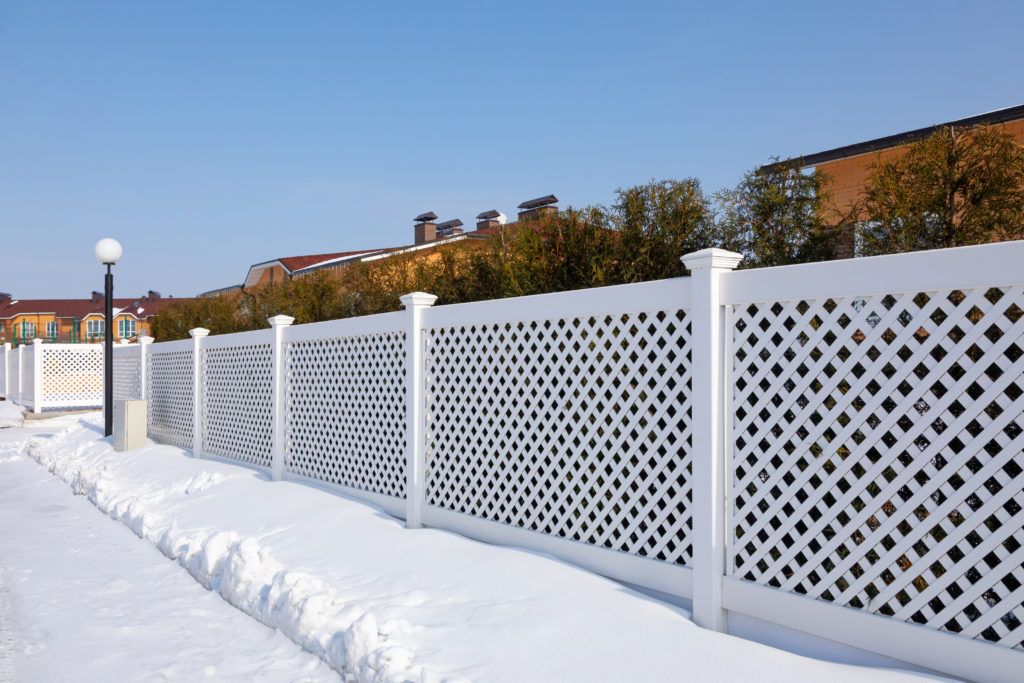NRV Fence & Handrail, LLC Knows Almost Everything About Vinyl Fences
This quarter, NRV Fence & Handrail’s blog is about the advantages and upkeep of vinyl fences. As the New River Valley’s leading expert on fencing for over 15 years, we know almost everything about vinyl fences. While we certainly wouldn’t recommend vinyl instead of aluminum, vinyl fences are different from aluminum fences.
Vinyl Fencing is Non-Toxic and Recyclable
To create vinyl fences, fencing manufacturers use plastic, such as polyvinyl chloride (PVC.) The process involves combining two complex layers of PVC through high-temperature melding and co-extrusion. Vinyl is a non-toxic material, as the manufacturer doesn’t treat it with chemicals after manufacturing. Vinyl can also be recycled if no longer needed. The vinyl fencing company combines PVC with other ingredients to make vinyl fences strong and flexible. The final result is vinyl fences require minimal maintenance. It creates aesthetic styles. Being strong and flexible and requiring minimal maintenance makes vinyl fences affordable.
Vinyl Fences Require Minimal Maintenance to Stay Looking Like New
Vinyl is a nonporous material—so, typically, it only takes spraying with a hose to clean. These vinyl fence surfaces don’t scratch easily, either. Because of how the manufacturer creates it, vinyl keeps its color; it doesn’t usually need touched up and repainted. Vinyl doesn’t rot away either. Since vinyl fences require minimal maintenance, repairs and supplies don’t cost a lot of money in the long run. Often, manufacturers offer lifetime warranties on the vinyl used to make vinyl fences.
Vinyl Fences are Both Strong and Flexible, Making Them Built to Last
Compared to wood, vinyl is about five times stronger, and doesn’t decompose over time. Vinyl fences won’t splinter, and don’t ignite readily. Vinyl is actually “self-extinguishing “and “fire resistant.” It also won’t rust, nor do pests cause long-term damage. Because vinyl also doesn’t absorb moisture, it doesn’t blister, rot, or peel. Harsh winds, heavy precipitation, or bitter winters don’t usually damage vinyl, because it’s both strong and flexible.
If the vinyl is made of 10 parts per 100 of titanium dioxide, the fence doesn’t fade after exposure to ultra-violet rays. Vinyl is four times more flexible than wood. Horses especially benefit from vinyl fences being strong and flexible. If a horse chews on or runs into the fencing, it doesn’t sustain injuries. Because a vinyl fence is strong and flexible, its typical life expectancy is 20 to 30 years.
Vinyl Fences Come in Assorted Aesthetic Styles
Vinyl fences come in assorted aesthetic styles. Choose from privacy, picket, ornamental, and post-and-rail designs. Privacy vinyl fences come in one-piece panels, eliminating the spaces between wood post fencing. This style makes vinyl ideal for backyards, pools, and fences surrounding dumpsters. In addition to aesthetic styles, vinyl fences come in various colors. Popular colors include white, tan, brown, gray, black, green, blue, and red. Often vinyl fences can be as high as six or eight feet. Additionally, a vinyl fence’s aesthetic style mimics wood fencing appearances while offering the aforementioned benefits.
Easy to Maintain Plus Strong and Flexible Makes Vinyl Fences Affordable
According to www.angi.com, a vinyl fence costs $3,720 on average. The cost can range between $2,230 to $5,380, depending on the style, labor needs, and the total length. Vinyl fences are priced by linear foot; the taller the fence, the more expensive the fence installation. True, vinyl fences can be expensive to pay for up front because of the manufacturing process. However, minimal maintenance plus being strong and flexible actually add up to making vinyl fences affordable.
There’s no need to pay for paints, stains, or treatments, to maintain vinyl fences. Barring a severe act of nature, you don’t have to replace them for upwards of 20 years. According to www.homeadvisor.com, installing vinyl fences costs between $2 and $6 per picket, while wood fences range from $2 to $10. The cost of cleaning vinyl fences includes water and soap.
Use Soapy Water to Wash of Grit and Dirt Off of Vinyl
Despite requiring minimal maintenance, vinyl fences still need maintained. To clean a vinyl fence, use soapy water to wash off grit and dirt. You can also use a garden hose to spray off leaves and paper that build up on the panels. After a damp winter, mildew may pop up in spots, so check where the panels and posts meet and under the rails.
Mix one and one-half cups warm water, a half-cup of mild bleach, and a quarter-cup of laundry detergent. Use a spray bottle or bucket with a soft cloth to get rid of mildew buildup. Inspect the fence at least once per year; shake the posts to check if they are still stable. Be sure to tighten screws or panel joins if they start to feel loose.
Call NRV Fence & Handrail, LLC, at (540) 392-8060 for more information on residential and commercial fences and handrails. We are happy to talk more about the advantages and upkeep of vinyl fences.

